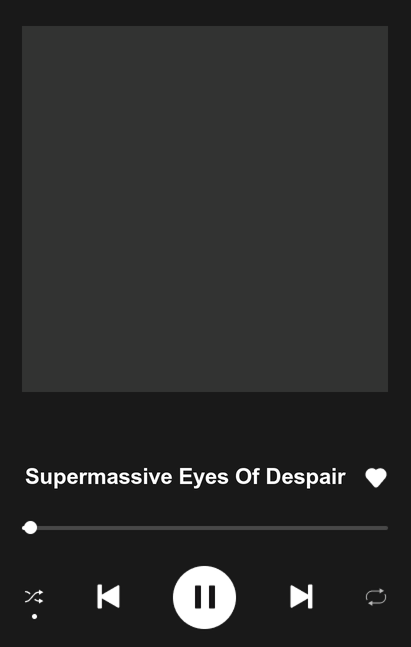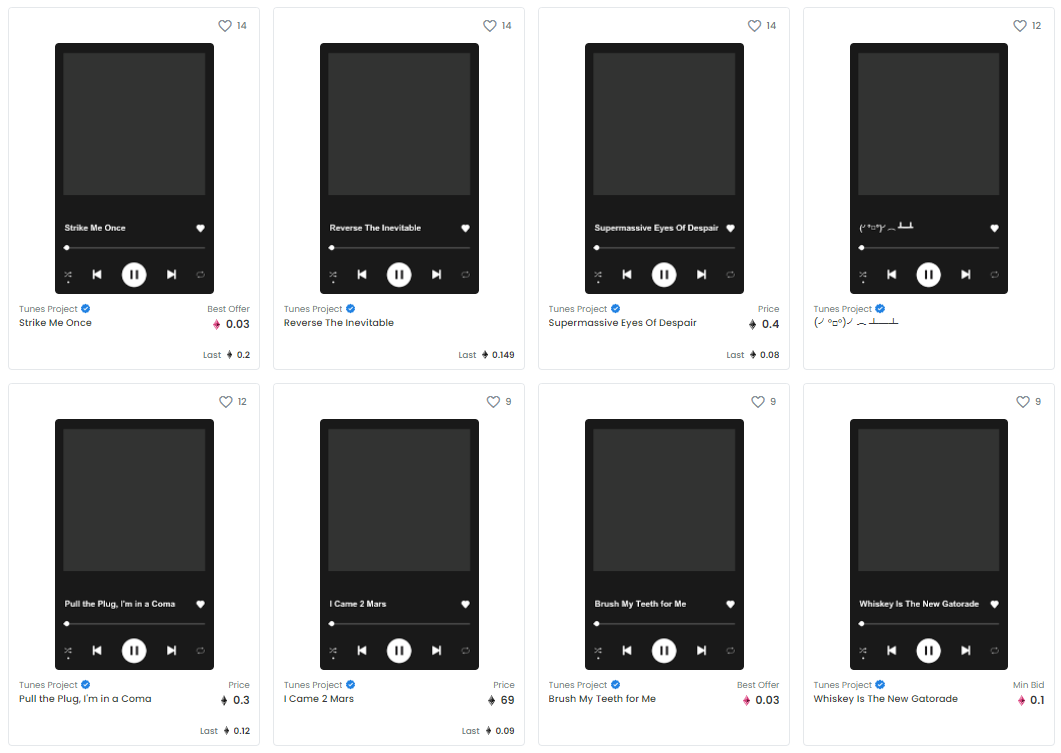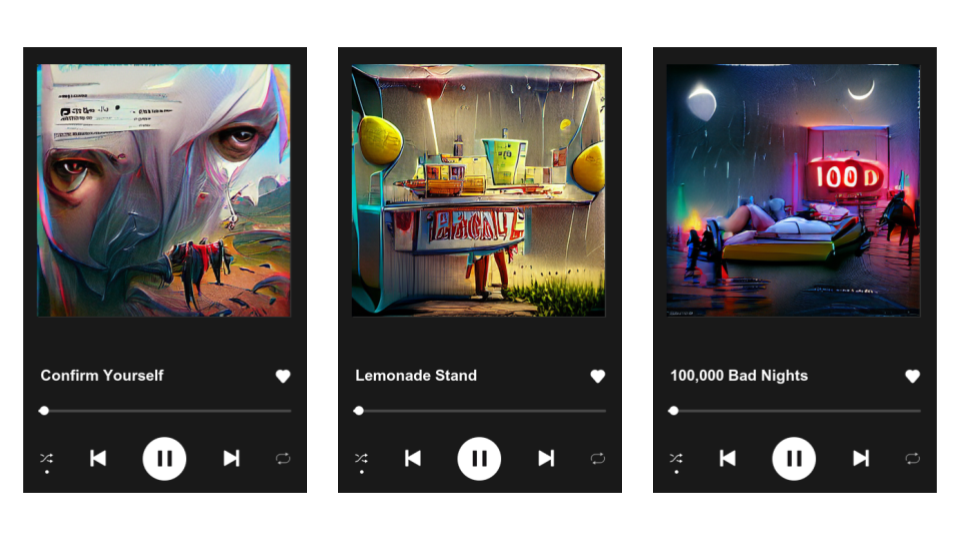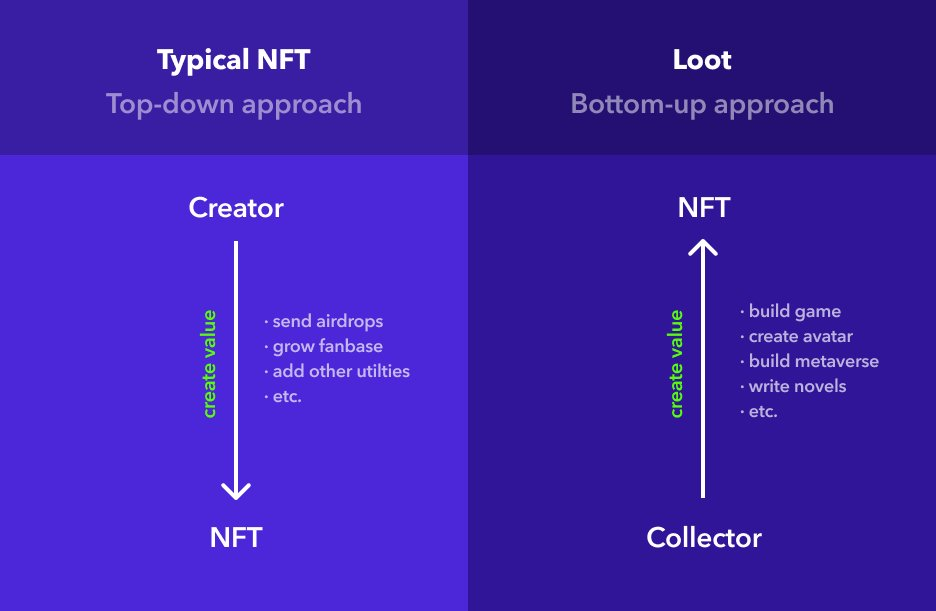A recent project called Tunes used AI to generate 5,000 unique NFTs. They’re songs, or rather, shells of songs – missing artwork, audio and an artist. That’s intentional. They serve as prompts for people to iterate on, tapping into a recent trend in the NFT space popularized by another project called Loot. Let’s dive in.

Loot
At the end of August an NFT project called Loot dropped. People could claim Loot NFTs for free by minting – only paying for the gas cost. Like NFT avatar projects, people did not know what they would get exactly after minting. Unlike other NFT projects, Loot was stripped from everything except text.
After minting, you’d get a list of gear. Text in an image. That’s all.
People loved it, because it felt like an invitation to imagine what you could build from this starting point. Quickly, an ecosystem emerged around the project.
Adventure Gold created a token to set a standard for projects building on Loot in the future. Role creates characters which can equip the Loot. Realms attempts to map out a world for Loot to exist in. And there are many other projects.
Mirror, the writing platform this article was first published on, ran a similar project called Heroes which would create randomized pen names and identities: text-only.
It’s different from many other NFTs, because instead of selling you something that is finished, you get the building blocks. Since everything’s on a blockchain with smart contracts, everyone can plug in and start building and expanding the project.
What if this idea was applied to music?
Tunes

Tunes started with a similar premise. 5,000 possible songs to mint for free, but without audio, cover art, or an artist. Building blocks.
A bot called Artunist was set up on the project’s Discord to generate artwork. People can submit the ID of the NFT they minted and then get artwork generated for it. The results are impressive.

The project has since expanded to include ‘Songs for Tunes’ which combines the generative artwork with artists and the music they made, with some being sold as NFTs for 1ETH ($3000~ at time of writing) like this beat by oshi or this song generated by the AI band (Twitter).
New games, new economies
The reason why I’m highlighting these projects is to show that there are new games to play, completely new avenues to explore. From the outside, the crypto space mostly gets attention for financial aspects while the cultural aspects don’t get picked up properly. When they do, it’s almost always in a financialized context… If an artist drops a new release on Spotify, we don’t say “Artist X is releases album on streaming service that raised over $2.1B in 18 rounds” yet that’s exactly what’s happening in the web3.
The actual exciting part is not really the money. It’s that anyone who perseveres can spin up a new project that can tap into any other project connected to the same blockchain. In that sense blockchains with smart contracts like Ethereum are global computers for us all to utilize. The web3 is iterative and music culture in the space is starting to embody that principle.
The first music artists who will never bother with the contemporary streaming landscape are likely already here, experimenting in the web3 and trying out other modes of collaboration, community-building, and are starting to make a living by doing so.
And to put it in Thanakron Tandavas’ words: that’s fucking cool.

Ray Laracuenta says:
Great article on fan DAOs. We are building a DAO based on our web 2.0 social activist platform, WeAct.chat. As such this piece really connected. The intersection of art, music, etc and grassroots work is very tight and we want to explore it.
WeAct is being ported to Dfinity.org’s Internet Computer with an alpha release planned for Q4. WeAct.chat is already out in the app stores (if you are curious to try it). That said, it will be reimagined on blockchain and renamed Catalyze to include both activists but also communities of interest, their patrons and their followers.
The DAO is planned for 3Q22 (along with a token offering) and a name change to Catalyze (4Q21). We would love to chat with you about all this and see if you think a story is there.
Ray Laracuenta
CEO/Founder Oblivion.io Software (makers of WeAct and soon Catalyze).
203-751-0803
ray@oblivion.io